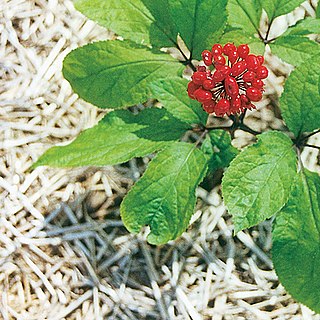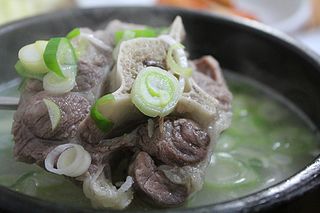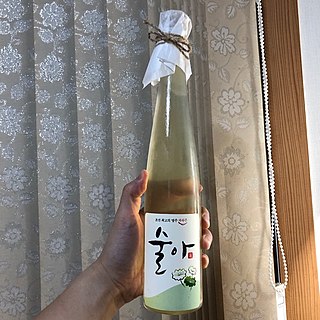An aphrodisiac is a substance alleged to increase libido, sexual desire, sexual attraction, sexual pleasure, or sexual behavior. These substances range from a variety of plants, spices and foods to synthetic chemicals. Natural aphrodisiacs like cannabis or cocaine are classified into plant-based and non-plant-based substances. Synthetic aphrodisiacs include MDMA and methamphetamine. Aphrodisiacs can be classified by their type of effects. Aphrodisiacs that contain hallucinogenic properties like Bufotenin have psychological effects on a person that can increase sexual desire and sexual pleasure. Aphrodisiacs that contain smooth muscle relaxing properties like yohimbine have physiological effects on a person that can affect hormone levels and increase blood flow.

Hongcheon (Hongcheon-gun) is a county and city in Gangwon Province, South Korea. The city lies on the northern bank of the Hongcheon River, southeast of Chuncheon. The terrain of the county is mainly mountainous and contains hot springs in the Hongcheong River valley. The county produces ginseng, maize, and vegetables. As of 2012 the county had a population of 70,401 people in 29,894 households.

Ginseng is the root of plants in the genus Panax, such as Korean ginseng, South China ginseng, and American ginseng, characterized by the presence of ginsenosides and gintonin. Ginseng is common in the cuisines and medicines of China and Korea.

Geumsan County is a county in South Chungcheong Province, South Korea. It borders Muju County, North Jeolla Province (Jeollabuk-do), which is famous for its ski resort nearby.

Eleutherococcus senticosus is a species of small, woody shrub in the family Araliaceae native to Northeastern Asia. It may be colloquially called devil's bush, Siberian ginseng, eleuthero, ciwujia, Devil's shrub, shigoka, touch-me-not, wild pepper, or kan jang. E. senticosus has a history of use in folklore and traditional Chinese medicine. Root extracts of E. senticosus are sold as a dietary supplement or cosmetic, usually under the name Siberian ginseng.

Panax ginseng, ginseng, also known as Asian ginseng, Chinese ginseng, Japanese gingseng or Korean ginseng, is a species of plant whose root is the original source of ginseng. It is a perennial plant that grows in the mountains of East Asia.

KT&G Corporation, originally Korea Tobacco &Ginseng, is the leading tobacco company in South Korea with annual sales over US$4 billion. KT&G was originally a government-owned monopoly but was privatized and today is publicly traded, competing for market share with other international tobacco firms such as Philip Morris International, British American Tobacco, and Japan Tobacco. KT&G's sales volume share was 62% of the Korean market in 2009.

Samgye-tang or ginseng chicken soup, meaning ginseng - chicken - soup in Korean, consists primarily of a whole young chicken (poussin) filled with garlic, rice, jujube, and ginseng. Samgye-tang is a Korean traditional soup for body health. Samgye-tang is a representative summer health food. Soup made with chicken that is slightly larger than the chick is called Yeonggye Baeksuk, and the chicken is divided into half is called Banggye-tang.

Pseudomonas aeruginosa is a common encapsulated, gram-negative, aerobic–facultatively anaerobic, rod-shaped bacterium that can cause disease in plants and animals, including humans. A species of considerable medical importance, P. aeruginosa is a multidrug resistant pathogen recognized for its ubiquity, its intrinsically advanced antibiotic resistance mechanisms, and its association with serious illnesses – hospital-acquired infections such as ventilator-associated pneumonia and various sepsis syndromes.

Baekseju is a Korean glutinous rice-based fermented alcoholic beverage flavored with a variety of herbs, ginseng most prominent among them. The name comes from the legend that the healthful herbs in baekseju will result an individual to live up to 100 years old.

Panax notoginseng is a species of the genus Panax, and it is commonly referred to in English as Chinese ginseng or notoginseng. In Chinese it is called tiánqī, tienchi ginseng, sānqī or sanchi, three-seven root, and mountain plant. P. notoginseng belongs to the same scientific genus as Panax ginseng. In Latin, the word panax means "cure-all", and the family of ginseng plants is one of the best-known herbs.
Nectria radicicola is a plant pathogen that is the causal agent of root rot and rusty root. Substrates include ginseng and Narcissus. It is also implicated in the black foot disease of grapevine. It is of the genus Nectria and the family Nectriaceae. N. radicicola is recognizable due to its unique anatomy, morphology, and the formation of its anamorph Cylindrocarpon desructans.

Gomguk (곰국), gomtang (곰탕), or beef bone soup refers to a soup in Korean cuisine made with various beef parts such as ribs, oxtail, brisket, ox's head or ox bones by slow simmering on a low flame. The broth tends to have a milky color with a rich and hearty taste.

Ginseng tea, or insam-cha, is a traditional Korean tea made with ginseng. While it is called a tea, ginseng tea does not contain tea leaves. It is a herbal tea infusion made out of the ginseng plant's root. Ginseng is a perennial herb derived from the aromatic root of Panax Ginseng Meyer, also known as Korean ginseng. Ginseng grows in shady forests that are cool and damp. It is a slow-growing plant and is difficult to cultivate. It can take four to six years before the root is ready to be harvested. Ginseng roots have a forked and twisted appearance that somewhat resembles the human body.

Gwaha-ju is a traditional Korean fortified rice wine. The refined rice wine cheongju is fortified by adding the distilled spirit soju to produce gwaha-ju. Popular varieties include gangha-ju (강하주) of Boseong and Yeonggwang in South Jeolla Province, sinseon-ju (신선주) of Namwon in North Jeolla Province, and yak-soju (약소주) of Suwon in Gyeonggi Province.
KGC is a ginseng company in South Korea. KGC's representative ginseng brand 'Cheong Kwan Jang's share in korean ginseng market is known to be dominant around over 80% and also accounted for to be 35% of Korea's total health products market in 2011.

Ginseng coffee is a beverage prepared from coffee and ginseng root.
Choi Kwang-hee is a South Korean volleyball coach, and was a player, as a wing spiker.
Ginseng chicken soup is a type of soup, which involves chicken and ginseng as one of the main ingredients. Ginseng can typically be cooked with chicken in broth, porridge, and soups. Varieties of ginseng chicken soup can be found in Asian countries, such as China, Malaysia, and Korea.
Phenylobacterium panacis is a Gram negative and rod-shaped bacterium from the genus of Phenylobacterium which has been isolated from the rhizosphere of a ginseng plant from the Hwacheon mountain in Korea.












